
As one of the oldest Euro-Atlantic member states in the region of Southeast Europe, Greece enjoys a prominent geopolitical role as a middle power, due to its political and geographical proximity to Europe, Asia, the Middle East and Africa. Its main allies are the United States, the United Kingdom, France, Italy, Cyprus and the rest of the European Union, NATO, and UN.

The foreign policy of the Netherlands is based on four basic commitments: to the Atlantic cooperation, to European integration, to international development and to international law. While historically the Kingdom of the Netherlands was a neutral state, since 1945 it has become a member of NATO, the United Nations, the European Union and many other international organizations. The Dutch economy is very open and relies on international trade. During and after the 17th century—its Golden Age—the Dutch built up a commercial and colonial empire. It was a leading shipping and naval power and was often at war with England, its main rival. Its main colonial holding was Indonesia, which fought for and achieved independence after 1945. The historical ties inherited from its colonial past still influence the foreign relations of the Netherlands. Foreign trade policy is handled by the European Union. The Dutch have been active in international peacekeeping roles.

The Ministry of Foreign Affairs is the Netherlands' ministry responsible for foreign relations, foreign policy, international development, international trade, diaspora and matters dealing with the European Union, NATO and the Benelux Union. The ministry was created in 1798, as the Department of Foreign Affairs of the Batavian Republic. In 1876, it became the Ministry of Foreign Affairs.

Greece and Ukraine have deep ties due to Orthodox Christianity and enjoy strong diplomatic relations, due to Greece’s active diplomatic support for Ukraine over the Annexation of Crimea by the Russian Federation. Greece is also one of the main supporters of Ukraine’s entry into NATO and the European Union. Greece recognized Ukraine on December 31, 1991. Both countries established diplomatic relations in 1992. Greece opened an embassy in Kyiv in 1993, general-consulates were set up in Mariupol and Odesa. Ukraine has opened an embassy in Athens and since April 2004 a general-consulate in Thessaloniki. Both countries are full members of the Organization for Security and Co-operation in Europe and of the Organization of the Black Sea Economic Cooperation. There is a large Greek community living in Ukraine. Ukraine was first settled by the Greeks as early as 500 B.C. The Ukrainian city of Odesa was founded by ancient Greek colonists, being also the place where the Filiki Eteria secret organization was founded.

Greece has an embassy in Berlin and five General Consulates in Hamburg, Munich, Düsseldorf, Stuttgart and Frankfurt. Germany has an embassy in Athens and a General Consulate in Thessaloniki. Germany and Greece are full members of the Organization for Security and Co-operation in Europe, of the Organisation for Economic Co-operation and Development, of NATO, of the European Union, and of the Eurozone.

The first contact between Greece and Sweden can be traced back to the 11th century. Both countries established diplomatic relations in 1852. Both countries are members of the Council of Europe, of the Organisation for Economic Co-operation and Development, of the Organization for Security and Co-operation in Europe, and of the European Union. Greece is a full member of NATO. Sweden is not a full member. Greece has given full support to Sweden's membership of the European Union. Greece supports Sweden's NATO membership.

The Hellenic Republic recognised the Republic of Estonia on May 19, 1922. Greece never recognised the Soviet annexation of Estonia. Both countries re-established diplomatic relations on October 2, 1991. In April 1997, Estonia has established an embassy in Athens. The Greek embassy in Tallinn opened in January 2005. Estonia has also 3 honorary consulates in Patras, Piraeus and Thessaloniki. Both countries are full members of the European Union and NATO.

Foreign relations exist between Austria and Greece. Both countries have diplomatic relations since the early 19th century, after the Greek War of Independence, and today's relations are considered excellent.
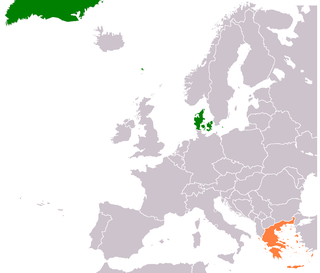
Denmark has an embassy in Athens and an honorary consulate in Thessaloniki. Greece has an embassy in Copenhagen and two honorary consulates in Arhus and Tórshavn. Both countries are full members of the Organization for Security and Co-operation in Europe, of the Organisation for Economic Co-operation and Development, of NATO and of the European Union.
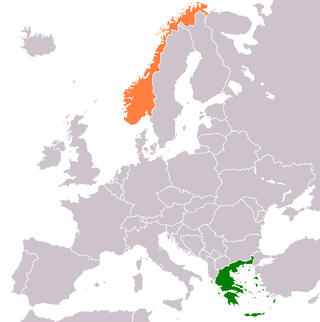
Greece–Norway relations are foreign relations between Greece and Norway. The Greek Embassy in Oslo opened in 1980 and the Norwegian Embassy in Athens opened in 1974.

Finnish-Greek relations are foreign relations between Finland and Greece. Greece was among the first countries to recognize the independence of Finland, on January 5, 1918. Both countries established diplomatic relations in 1920. Since February 1, 1977, Finland has had an embassy in Athens. For a long period Finland was represented in Greece through its embassies either in Bucharest, Rome or Belgrade. Finland also has 7 honorary consulates in Kos, Patras, Pireus, Rhodes, Thessaloniki, Heraklion, and Corfu. Greece has an embassy in Helsinki and 4 honorary consulates in Turku, Kuopio, Oulu, and Rovaniemi.
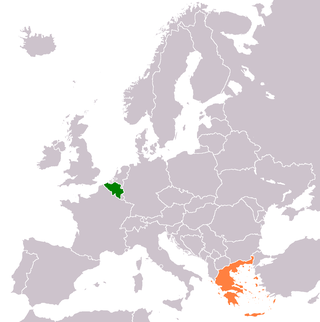
Belgian-Greek relations are foreign relations between Belgium and Greece. Both countries established direct diplomatic relations in 1874. Belgium has an embassy in Athens and 7 honorary consulates in Corfu, Iraklion, Mytilini, Patras, Piraeus, Rhodes and Thessaloniki. Since 1945, Greece has an embassy in Brussels.

France–Greece relations, or Franco-Greek relations, are foreign relations between France and Greece. In modern history, both countries established diplomatic relations in 1833, three years after Greek Independence. France and Greece, due to strong cultural and historical ties, have had a traditionally strong and special relationship and strategic alliance for decades and today enjoy strong diplomatic relations also.

Croatian–Dutch are foreign relations between Croatia and Netherlands. Both countries established diplomatic relations on April 23, 1992. Croatia has an embassy in The Hague. The Netherlands have an embassy in Zagreb and 3 honorary consulates . Both countries are full members of the European Union and NATO. Netherlands joined the EU as a founding member state, and Croatia joined the EU in 2013. The Netherlands has given full support to Croatia's membership in the European Union and NATO.
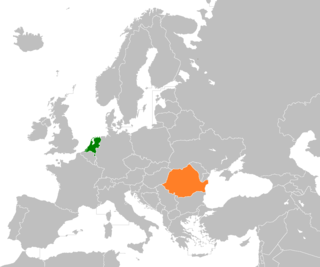
Netherlands–Romania relations are the bilateral relations between the Netherlands and Romania. The Ambassador to Romania is concurrently accredited to Moldova. Romania has an embassy in The Hague and honorary consulates in Heeg, Rotterdam and Venlo. The Netherlands has an embassy in Bucharest, honorary consulates in Cluj-Napoca, Timișoara and Constanța, and since 2016 an office in Chișinău in Moldova.

Dutch–Finnish relations are foreign relations between the Netherlands and Finland. The Netherlands recognised Finland's independence on 28 January 1918. Diplomatic relations between them were established on 14 August 1918. The Netherlands has an embassy in Helsinki and consulates. Finland has an embassy in the Hague, an honorary consulate general in Amsterdam and other honorary consulates in Rotterdam and Terneuzen. Both countries are full members of the European Union. The Netherlands supported Finland's NATO membership during Finland's accession into NATO, which was finalized on 4 April 2023.
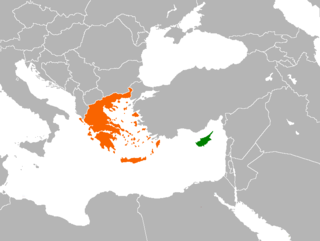
Cyprus–Greece relations are the bilateral relations between Cyprus and Greece. Cyprus has an embassy in Athens and a consulate-general in Thessaloniki. Greece has an embassy in Nicosia. Both countries are full members of the United Nations, European Union, Council of Europe and the Organization for Security and Co-operation in Europe (OSCE). Relations between the two countries have been exceptionally close since the Republic of Cyprus was formed in 1960. The Greek populations in Cyprus and Greece share a common ethnicity, heritage, language, and religion, leading to an exceptionally close relationship between the two countries.

North Macedonia–Turkey relations are the bilateral relations between North Macedonia and Turkey. Both countries are full members of the Council of Europe and of the NATO. North Macedonia has an embassy in Ankara and a Consulate General in Istanbul. Turkey has an embassy in Skopje.

Bilateral relations exist between Greece and North Macedonia. Greece has an embassy in Skopje, and a Consulate General in Bitola. Similarly, North Macedonia maintains an embassy in Athens, and a consulate-general in Thessaloniki. Both countries are members of the Council of Europe and NATO. Greece is an EU member and North Macedonia is an EU candidate.

Croatia–North Macedonia relations are foreign relations between Croatia and North Macedonia. Two countries established diplomatic relations on 30 March 1992. Croatia is represented in North Macedonia via its Embassy in Skopje and honorary consul in Strumica while North Macedonia is represented in Croatia via its Embassy and the Cultural and Informational Center in Zagreb as well as consulate in Rijeka and honorary consul in Zadar. Croatia supports North Macedonia's European Union membership. Before their independence in early 1990s, both countries were constituent republics of the Socialist Federal Republic of Yugoslavia as the SR Croatia and SR Macedonia respectively. Croatia was one of the first countries in the world to recognize the independence of the country during the period in which Zagreb itself awaited international recognition. During the long-lasting Macedonia naming dispute (1991-2019) and before the signature of the Prespa agreement Croatia was the first country in the world to recognize North Macedonia under its constitutional name of the Republic of Macedonia instead of appellation "the former Yugoslav Republic of Macedonia". Today, both countries are full members of the Council of Europe, and of the NATO. Croatia is an EU member and North Macedonia is an EU candidate. Since 2006 North Macedonia is a member state of the Central European Free Trade Agreement while Croatia was a member of the area between 2003 and 2013. Croatia strongly supports accession of North Macedonia to the European Union and also supported its NATO membership, being one of the first countries to ratify the membership protocol. Trade between the two countries reached 221 million euros in 2020.





















